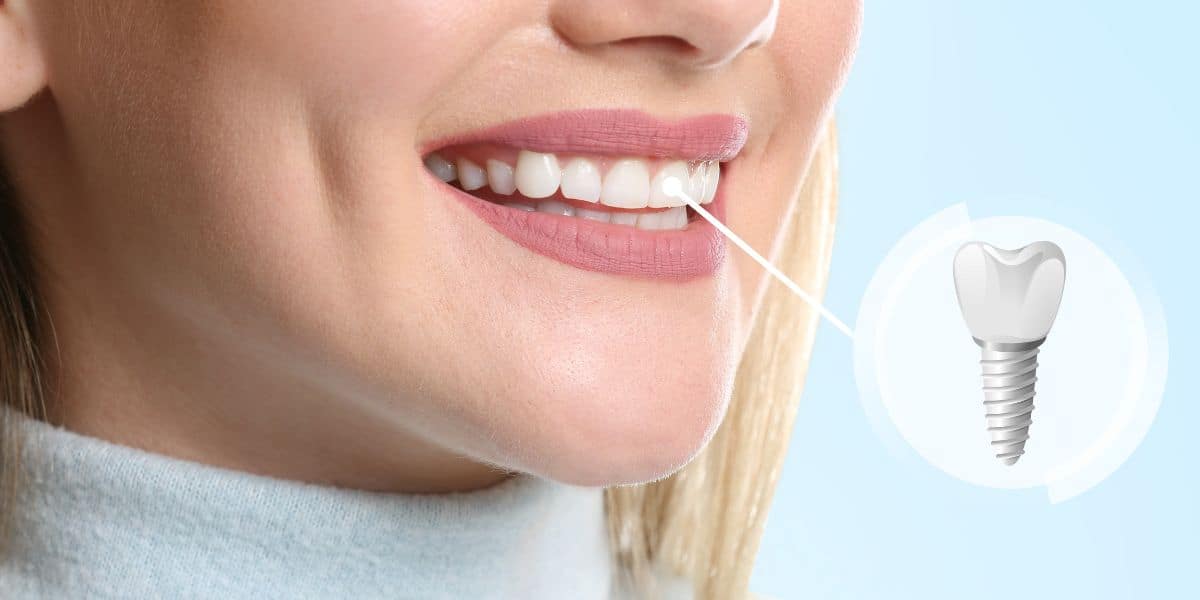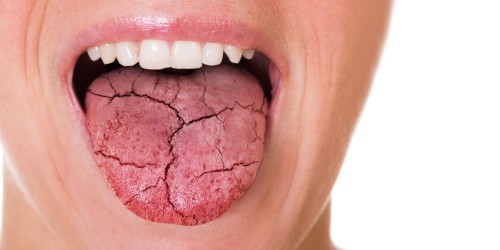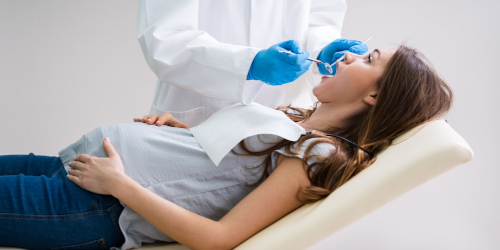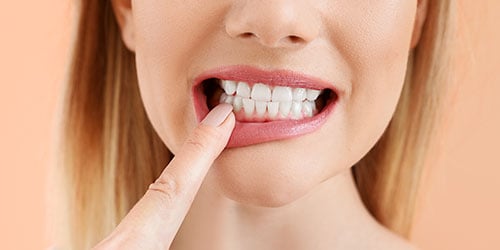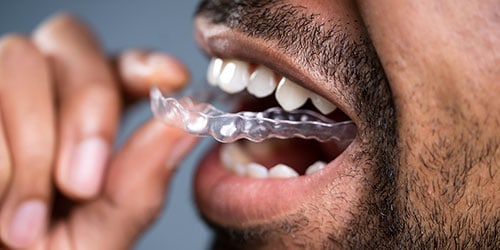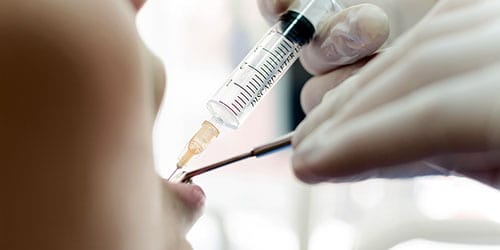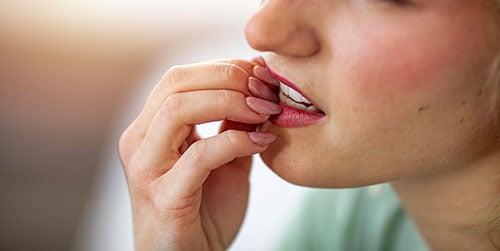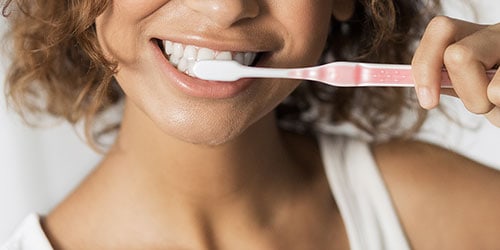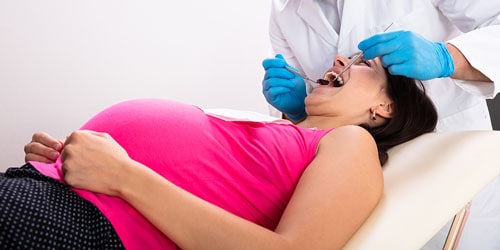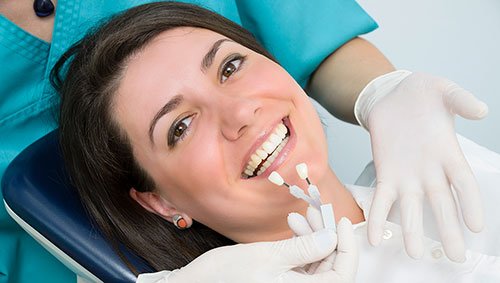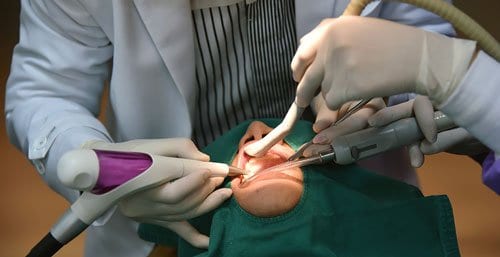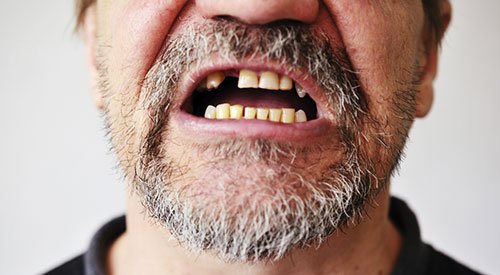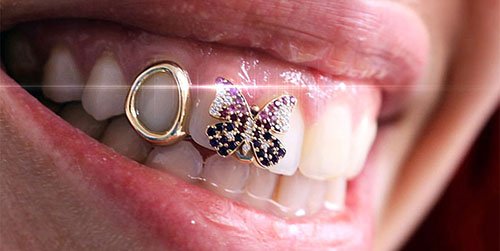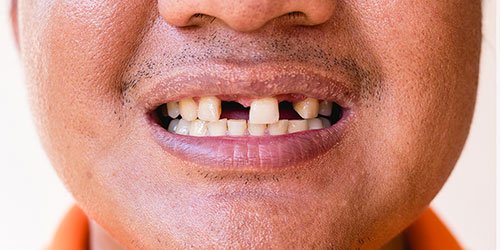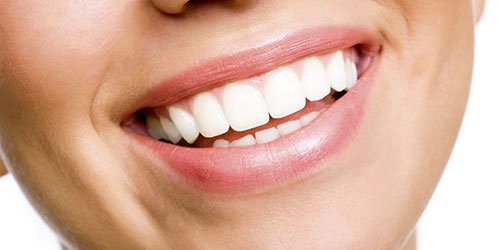Gingivitis while pregnant is a common periodontal health issue – but it’s not a completely harmless one.
A full-term pregnancy lasts about nine months; this short period of time leaves a low risk of tooth loss or developing a severe periodontal infection. For the baby, however, the consequences may be more profound.
Studies now show that developing gingivitis while pregnant carries an increased risk of preterm birth and other negative birth outcomes. This is extra worrisome because many types of periodontal treatment can’t be done on pregnant women.
But why does this happen? How can gum disease affect pregnancy to this degree? Are both caused by something else? And more importantly – how can you protect yourself and your future baby?

What is pregnancy gingivitis?
Gingivitis is one of the most common oral health problems. It is triggered by bacteria (mostly Porphyromonas gingivalis) growing inside the mouth. When bacteria nest around the gums, they can cause swelling, redness, and even bleeding.
Both gingivitis and its more serious cousin, periodontitis, can happen among people of all ages. They are more prevalent among people over 50 and those with diabetes or other chronic systemic diseases. Other risk factors for periodontal infection include smoking, insufficient vitamin C, low educational level, and poor oral hygiene habits.
Yet, one more subgroup is particularly prone to developing gingivitis: pregnant women. Why?
Experts are not sure, but the general understanding is that pregnancy hormones (estrogen and progesterone) play a role. Both hormones can slightly change the pH of the mouth and raise blood sugar levels – two things that oral pathogens seem to love. As a result, gingivitis develops suddenly and quickly, especially during the second trimester. This is known as maternal periodontal disease.
We have explored pregnancy gingivitis in depth before – here, you can learn more about its signs, symptoms, and how to prevent it. Today, we will focus on its effects on your unborn child, and how it makes periodontology a public health concern.
How does gum disease affect pregnancy?
A leading international journal recently published a systematic review study, examining all the evidence linking gum disease while pregnant with adverse pregnancy outcomes, such as premature delivery or low-birth-weight (LBW) babies.
Like any study of this kind, the text is heavy in jargon, but we will try to simplify as best as possible. In this review, researchers examined 10 different observational studies from around the world (from Iran and Brazil to the USA), all published between 2005 and 2015.
The studies used had all been published in English and came from prestigious journals indexed in Google Scholar, the National Institutes of Health (NIH) PubMed system, and the Cochrane database. In all studies selected, the mean maternal age of the participants was 24.
Finally, to qualify, the studies all had to be cohort studies and case-control studies. What does this mean? Essentially, they limited themselves to observing the women who participated, noting whether they developed maternal periodontitis and had problems during labor.
This is different from controlled trials, where researchers will try a specific treatment with a group of people and compare their outcome with those who didn’t receive it.
So what did they find?
Overall, yes, there is a “significant association” between pregnancy gingivitis and preterm labor. Depending on the degree of gum damage, gum disease brought about a higher incidence of prematurity (babies born with a gestational age of less than 37 weeks), pre-eclampsia, and low-birth-weight babies.
They also examined the mothers for other risk factors, such as their educational level, income, or the baby’s sex. However, they found no significant difference in their chances of premature birth.
Is mild pregnancy gingivitis just as bad for the baby?
Gingivitis is a progressive disease, and there’s a difference between the occasional red gum and full-blown periodontal disease. This difference affects both mother and baby.
To assess the impact of different levels of gingivitis, the researchers also examined the clinical periodontal status of the women and ranked them into five categories, according to the degree of damage to periodontal tissues. These were numbered from 0 to 4 and went from healthy gums to those with mild gingivitis or who had developed bleeding, periodontal pockets (gaps between the gum and the tooth), or even those at risk of losing a tooth (clinical attachment loss).
They found that the deeper the pocket, or the more severe the gingivitis, the higher the risk for the baby.

For example, the women who had been ranked into categories 3 and 4 (severe gum disease) were nearly twice as likely to have premature babies as women in category 0 (no gum disease). In addition, women in categories 2 through 4 (moderate to severe gum disease) had a higher chance of experiencing “fetal growth restriction” (a baby that doesn’t grow as expected, despite a full-term pregnancy), pre-eclampsia, or fetal distress during labor.
Why does this happen?
The problem for the baby is not the oral bacteria directly but rather the mom’s response to it. Even if its effects are confined to the mouth, gingivitis is an inflammatory disease. That means it triggers the production of cytokines and prostaglandins, two hormones that help set off immune reactions and scarring.
When the body feels under attack, large amounts of both hormones begin circulating in the bloodstream. Then, some of them – especially a type of prostaglandin known as E2 – can cross the placental membranes, where they can affect the baby. Once inside the placenta, E2 can act as an inflammatory mediator — essentially, a “messenger” that gets all surrounding organs to ready for battle — and trigger a preterm delivery.
And as your obstetrics expert may have already warned you, being underweight at birth can spell trouble for years to come.
What are some low birth weight symptoms and consequences?
For people who don’t work in healthcare, the terms “premature baby” or “low birth weight delivery” appear the same. In reality, there are subtle differences.
Low birth weight babies (those born weighing under 5 pounds, 8 ounces) are not simply small, they are also at a higher risk of systemic diseases and life-long problems.
Granted, this is not universal: many small babies (especially when they come from small parents) develop as expected and are as healthy as their peers. Other causes for LBW infants include malnourishment during pregnancy, chronic diseases, or using caffeine or tobacco while pregnant.

According to epidemiology experts, the most common cause for babies with low birth weight is preterm delivery: when labor begins before 37 weeks of gestation.
A baby born too soon doesn’t get to develop fully inside the womb. Premature babies often need to spend some time in an incubator or Neonatal ICU. Among preterm low birth weight infants, there is a higher prevalence of immune problems, difficulties eating and gaining weight, or slow vocabulary development.
An ounce of prevention is worth a pound of cure
When we look at these statistics, it is easy for things to look grim – especially if you’ve had trouble with gum disease before! At MD Periodontics, we believe that oral health is an essential component of overall health, and we are happy to take part in a larger prenatal care team.
While pregnant, many elective treatments get postponed, and there is a laundry list of medication that you will need to stay away from (including most anesthetics). This means that most types of periodontal therapy used for advanced gum disease will be off the table for a while.
Instead, preventive care should be the way to go! If you are planning to become pregnant or recently found out you are expecting, book a complete periodontal examination. A deep cleaning and a thorough oral hygiene routine can keep mild gingivitis from progressing and affecting you or your baby.
Worried about periodontal disease while pregnant? MD Periodontics can help!
You can count on two of the most respected periodontists in Southern California to help you! Dr. Abdy Moshrefi and Dr. Nazanin Daneshman are a husband-and-wife team of board-certified periodontists and holistic dentists.
At their Beverly Hills clinic, they aim to provide a relaxing and supportive environment for their patients. Advanced technology, excellent training, a soft bedside manner, and a stylish environment will make oral care a pleasure, not an obligation.
To schedule a consultation, click here or call us at (310) 859-9449. A spa-like atmosphere, staffed by a team who truly cares about your smile, awaits you!
MD Periodontics is conveniently located for patients throughout the metropolitan Los Angeles area. Our board-certified periodontists and implant dentistry experts are available at locations in or near Beverly Hills, Santa Monica, West Los Angeles, Culver City, West Hollywood, Downtown Los Angeles, Marina del Rey, Pacific Palisades, Malibu, Manhattan Beach, Sherman Oaks, and Encino.
References
Teshome, A., & Yitayeh, A. (2016). Relationship between periodontal disease and preterm low birth weight: systematic review. The Pan African medical journal, 24, 215.
Offenbacher, S., Katz, V., Fertik, G., Collins, J., Boyd, D., Maynor, G., McKaig, R., & Beck, J. (1996). Periodontal infection as a possible risk factor for preterm low birth weight. Journal of Periodontology, 67 (10 Suppl), 1103–1113. https://doi.org/10.1902/jop.1996.67.10s.1103
- How To Pick The Best Dental Implant Specialist Near Me - September 17, 2024
- Can Bleeding Gums Be a Symptom of Something More Serious? - May 27, 2024
- What Is Hydroxyapatite Toothpaste, and Is It Better for You? - May 1, 2024
 (310) 859-9449
(310) 859-9449 Study Alert: Periodontal Disease During Pregnancy Increases the Risk of Low-birth Weight Babies
Study Alert: Periodontal Disease During Pregnancy Increases the Risk of Low-birth Weight Babies
 or call us at
or call us at 




